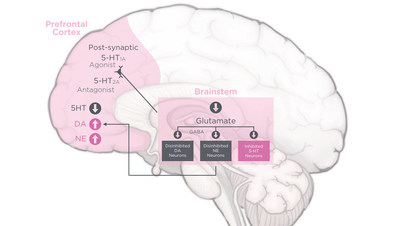RALEIGH, N.C., Feb. 17, 2015 /PRNewswire/ -- Sprout Pharmaceuticals announced today that it has resubmitted a New Drug Application (NDA) to the U.S. Food and Drug Administration (FDA) for flibanserin, an investigational, once-daily, non-hormonal pill for Hypoactive Sexual Desire Disorder (HSDD) in premenopausal women. If approved, flibanserin will be the first and only FDA-approved treatment for HSDD.
“This NDA resubmission marks the completion of the additional clinical studies requested by FDA,” said Cindy Whitehead, CEO of Sprout Pharmaceuticals. “The FDA has devoted significant resources to understand HSDD and the need for medical treatment. I believe that the Agency’s efforts to bring together panels of patients and clinical experts will prove to be a significant step in bringing about a solution for women with HSDD to market. This year, I am optimistic that women and their partners affected by the life impact of HSDD will have their first potential medical solution.”
The resubmission comes after Sprout received a Complete Response Letter from the FDA for flibanserin in 2013. Sprout appealed the FDA’s decision, and at the request of the Agency, completed a Phase 1 pharmacokinetic study and a Phase 1 driving study. Results from these studies were included in the resubmission package.
“The brain plays an important role in regulating a woman’s sexual desire, and one of the root causes of persistent and recurrent low sexual desire, or HSDD, stems from an imbalance of neurotransmitters in the brain,” said Stephen Stahl, Adjunct Professor of Psychiatry, University of California San Diego, School of Medicine. “Flibanserin is believed to work by correcting this imbalance and providing the appropriate areas of the brain with a more suitable mix of brain chemicals to help restore sexual desire.”
Flibanserin was evaluated in three pivotal Phase 3, randomized, double-blind, placebo-controlled, parallel-group North American studies of premenopausal women with a mean age of 36 years. In all trials, flibanserin demonstrated a statistically significant difference compared to placebo on three key endpoints: an increase of sexual desire; a decrease in distress from the loss of sexual desire; and an increase in the frequency of satisfying sex.
The flibanserin safety profile has been well characterized in clinical trials. The most common side effects observed were dizziness, nausea and sleepiness.
About Hypoactive Sexual Desire Disorder (HSDD)
HSDD is the most commonly reported form of female sexual dysfunction. HSDD has been medically recognized for more than 30 years and is defined as a persistent or recurrent deficiency or absence of sexual fantasies and desire for sexual activity that causes marked distress or interpersonal difficulty, and which is not better accounted for by a medical, substance-related, psychiatric (e.g., depression) or other sexual condition.
About Flibanserin
Flibanserin is a novel, non-hormonal drug that has been clinically studied in over 11,000 women. Flibanserin is a Multifunctional Serotonin Agonist Antagonist (MSAA) and, if approved, would be the first and only post-synaptic 5HT1A receptor agonist and 5HT2A receptor antagonist available to prescribers for the treatment of premenopausal women with HSDD. It is believed that flibanserin helps restore prefrontal cortex control over the brain’s motivation/rewards structures enabling sexual desire to manifest. This is thought to be accomplished by the rebalancing of neurotransmitters that influence sexual desire. Specifically, flibanserin increases dopamine and norepinephrine (both responsible for sexual excitement) while transiently decreasing serotonin (responsible for sexual satiety/inhibition) in the brain’s prefrontal cortex. This is likely accomplished by reduced glutamate transmission. In clinical studies, flibanserin was evaluated for its ability to increase the frequency of satisfying sexual events, increase the intensity of sexual desire and decrease the associated distress women feel from its loss.
About Sprout Pharmaceuticals
Sprout Pharmaceuticals is passionate about women’s sexual health. With a breakthrough concept for women, the company “sprouted” out of Slate Pharmaceuticals in 2011. Based in Raleigh, NC, the company is focused solely on the delivery of a treatment option for the unmet need of women with HSDD. Sprout is pursuing the FDA approval of flibanserin to treat HSDD in premenopausal women, for which there is currently no FDA-approved treatment.
For more information or the latest news about Sprout Pharmaceuticals, visit www.sproutpharma.com.


Media Contact:
Geoff Curtis
312-233-1253 (o)
312-550-8138 (c)
geoff.curtis@edelman.com
Video - http://origin-qps.onstreammedia.com/origin/multivu_archive/PRNA/ENR/175602-Desire-Discovery-Clip.mp4
Photo - http://photos.prnewswire.com/prnh/20150213/175603
Photo - http://photos.prnewswire.com/prnh/20150213/175604
To view the original version on PR Newswire, visit:http://www.prnewswire.com/news-releases/sprout-pharmaceuticals-resubmits-flibanserin-new-drug-application-for-the-treatment-of-hypoactive-sexual-desire-disorder-in-premenopausal-women-300036681.html
SOURCE Sprout Pharmaceuticals
 Help employers find you! Check out all the jobs and post your resume.
Help employers find you! Check out all the jobs and post your resume.




